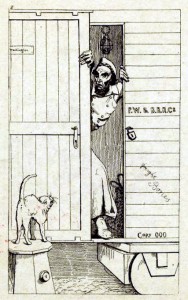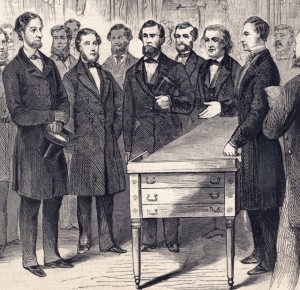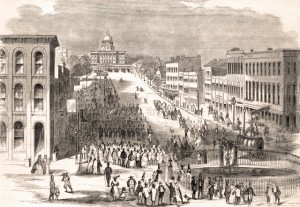 News coverage of Civil War events continued to run high this past week as the nation remembers the 150th anniversary of the beginning of the conflict. The main event this week in history was Abraham Lincoln’s inauguration as president on March 4, 1861.
News coverage of Civil War events continued to run high this past week as the nation remembers the 150th anniversary of the beginning of the conflict. The main event this week in history was Abraham Lincoln’s inauguration as president on March 4, 1861.
William C. Kashatus of the Philadelphia Inquirer provided a thoughtful overview of Lincoln’s first inaugural entitled “Speech that Launched the Lincoln Presidency.” The address, which was just 35 minutes, reflected the “balanced rhetoric of a shrewd politician,” according to Kashatus. Although Lincoln has become known as the “Great Emancipator,” his primary goal was to ensure that the Union was perpetual and vowed not to “interfere with slavery in the Sates where it existed.” Lincoln was both “firm and compassionate” in his first speech as president, and ended with an impassioned plea to his “dissatisfied fellow countrymen:”
“We are not enemies, but friends. We must not be enemies. Though passion may have strained it must not break our bonds of affection. The mystic cords of memory, stretching from every battlefield and patriot grave to every living heart and hearthstone all over this broad land, will yet swell the chorus of the Union, when again touched, as surely they will be, by the better angles of our nature.”
David Jackson of the USA Today reported on a proclamation by President Obama in honor of Lincoln’s first inaugural. The President said that the “rugged rail-splitter” and “humble lawyer” helped heal the bloody divisions of Civil War through “simple eloquence and humble leadership marked by profound wisdom.”
“The Oval,” the USA Today’s project tracking the Obama presidency, also offered a concise take on the first inauguration.
Patrick Teegarden, contributing to the Colorado Statesman’s sesquicentennial column, wrote an article describing how “Lincoln’s Inaugural Addresses spearheaded our journey towards equality and freedom.”
Doug Kendall, Founder and President of the Constitutional Accountability Center, authored an interesting article entitled “Remembering the Civil War in the Tea Party Age.” As he discusses the debate about whether the Confederacy fought mainly over slavery or states’ rights, he points out that the Tea Party-infused politicians have been making arguments in favor of nullification and secession, as if the Confederacy had prevailed on its’ states rights’ platform. He says that we should celebrate the Constitution of our time, not “yearn for days long past when our Constitution, and our Union, were far less perfect.”
Andrew Glass of Politico provided a brief article commemorating Lincoln’s second inaugural address. Calling it one of Lincoln’s most powerful speeches, the magnanimous address was made even more powerful by his assassination, which occurred little more than a month after he delivered it.
In related news, Robert Redford is the director of The Conspirator (pictured above), a new movie about the plot to assassinate Lincoln to be released on April 15, 2011.
 One hundred fifty years ago today William Willey (Class of 1862) wrote to his father about whether he could remain at Dickinson College and described the conditions in Carlisle as residents prepared for war. Willey lived in western Virginia and his father was serving as a delegate at the Secession convention in Richmond, Virginia. As he told his father, “it is probable that they will not suffer any of us from the South to remain more than a day or two longer.” Willey, however, was not as concerned as other southern students. “The only ones that are in danger are the students from [South Carolina],” as Willey observed. Yet Willey hoped that he could remain at Dickinson College and graduate in 1862. “I will regret it more than any circumstance of my life, should I be compelled to go,” as Willey explained. In addition, Willey’s letter included his observations of Carlisle as residents prepared for war. “The depot is crowded with women bidding adieu to their husbands and sons, and all appear to be mad with excitement,” as Willey described. Carlisle residents even “compelled [Dickinson College] to hoist the stars and stripes,” as Willey noted. You can listen to this letter by clicking on the play button below:
One hundred fifty years ago today William Willey (Class of 1862) wrote to his father about whether he could remain at Dickinson College and described the conditions in Carlisle as residents prepared for war. Willey lived in western Virginia and his father was serving as a delegate at the Secession convention in Richmond, Virginia. As he told his father, “it is probable that they will not suffer any of us from the South to remain more than a day or two longer.” Willey, however, was not as concerned as other southern students. “The only ones that are in danger are the students from [South Carolina],” as Willey observed. Yet Willey hoped that he could remain at Dickinson College and graduate in 1862. “I will regret it more than any circumstance of my life, should I be compelled to go,” as Willey explained. In addition, Willey’s letter included his observations of Carlisle as residents prepared for war. “The depot is crowded with women bidding adieu to their husbands and sons, and all appear to be mad with excitement,” as Willey described. Carlisle residents even “compelled [Dickinson College] to hoist the stars and stripes,” as Willey noted. You can listen to this letter by clicking on the play button below:















